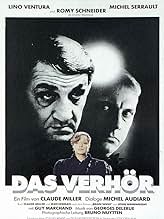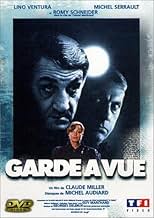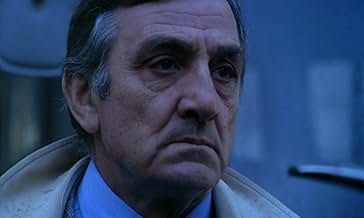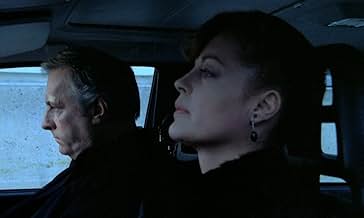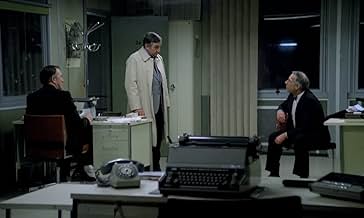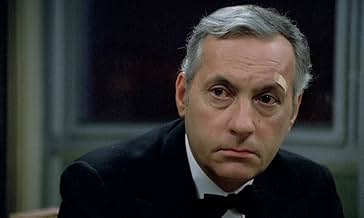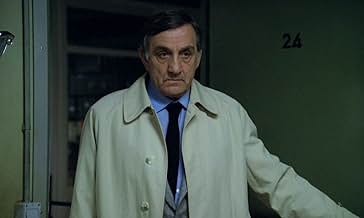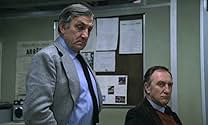VALUTAZIONE IMDb
7,6/10
5882
LA TUA VALUTAZIONE
Un ispettore di polizia, sospettando di un avvocato su due omicidi di minori, lo ha trattenuto per una sessione di interrogatori che va avanti per ore.Un ispettore di polizia, sospettando di un avvocato su due omicidi di minori, lo ha trattenuto per una sessione di interrogatori che va avanti per ore.Un ispettore di polizia, sospettando di un avvocato su due omicidi di minori, lo ha trattenuto per una sessione di interrogatori che va avanti per ore.
- Regia
- Sceneggiatura
- Star
- Premi
- 6 vittorie e 5 candidature totali
Mohammed Bekireche
- Arab
- (non citato nei titoli originali)
Claude Carliez
- Un policier
- (non citato nei titoli originali)
Recensioni in evidenza
Those who watch French films either to improve their knowledge of French cinema or to learn subtle nuances of French language cannot remain indifferent to the charms of the great French actor Lino Ventura. There is some kind of "JE NE SAIS QUOI" type of quality in him which makes him stand apart from the usual group of French actors. Garde à Vue sees him paired against Michel Serrault who is also considered as one of France's important actors.This entire film is their indispensable vehicle to deliberate about justice,law and unusual methods of police procedures.A deft cat and mouse game with limited movement could be considered as this film's apt description.In the midst of these two towering figures,there are also some minor figures who steal the show on their own.Director Claude Miller achieves this effect by casting Guy Marchand as a police inspector and Romy Schneider as the main suspect's wife.The dialogs penned by Michel Audiard have a certain kind of literary aura to them.This is one reason why viewers would be more interested in pricking up their ears in order not to miss any line.Film critic Lalit Rao saw this film during Franco-German mystery and thriller film festival organized by Alliance Française de Bangalore and Goethe Institut in 1992.
Inspector Antoine Gallien (Lino Ventura) is a no non-sense and practical man who only believes in facts and evidence, and is assigned on the New Year 's Eve to question a wealthy tuxedo-wearing attorney named Jerôme Martinaud (Michel Serrault), suspected for the rape and murder of two little girls. There's no real evidence against him except that he was near the locations where the victims were found. So, because he was at the wrong places, at the wrong moments, he naturally falls "under suspicion" (a wink to the US remake's title).
"Garde à Vue" has only four main characters, the two leads plus Gallien's colorful assistant Marcel Belmont (Guy Marchand) and Martinaud's cold and sophisticated wife (Romy Schneider in her next to last role). And through a short running-time of eighty something minutes and a very austere setting such as the commissariat of a French small town, the whole movie consists on a long questioning session where Gallien tries to establish Martinaud's alibi, if he ever has one. Needless to say that both actors are perfect: Ventura plays the determined and competent cop with a bluffing realism, and Serrault's nervousness and confusion, powerful convey the idea of a man who's not acting natural. It takes some super-human acting strength to naturally play a non-natural character. As the session progresses, it becomes obvious that Martinaud can't afford an alibi, yet it's also obvious that Gallien doesn't want to be misguided by this obviousness.
And in fact, even the film seems to be governed by a sort of deliberately misguiding impression, as if it was manipulating us like Martinaud seems to manipulate his audience. Indeed, "Garde à Vue" strikes by an astonishing minimalism: It's a film of a few words, a few scenes, a few actors, but each of these elements is perfect and doesn't ask for more. Directed by Claude Miller and written by one of the greatest French screenwriters, Michel Audiard, "Garde à Vue" is a film that meticulously concentrates all the elements of greatness that make the best cop/thrillers and elevate it to another dimension. More than a cop/thriller, "Garde à Vue" is a remarkable character study where the flaws of its main character are highlighted by a confrontation with a totally opposite personality. We look at Martinaud from Gallien's perspective, then from his wife's, and we try to find out by ourselves not if he's guilty or not guilty but what kind of man, he really is.
Like another minimalist masterpiece, "12 Angry Men", "Garde à Vue" is an intelligent introspection into the way human personalities from different backgrounds can interact in their quest for facts and truths. How intelligence and the conscience of one's own failure and mediocrity can work as a mask to disguise emotions. And the film is full of them, the questioning starts in a very polite way. Progressively, Martinaud expresses his displeasure to be taken in an interrogation room while everyone celebrates the New Year's Eve. But he's incapable of providing an alibi, and therefore slips into the suspect n°1 category. Belmont believes he's guilty and tries to get the confession the easy way, by slapping Martinaud around when Gallien is absent. But it doesn't work, Martinaud oscillates between a state where he asserts his rights and others where he falls in his miserable condition, convinced that he's only accused by people because they're as mediocre as him and can't stand the idea of a mediocre man succeeding.
And 'mediocre' is an epithet that fits Martinaud, thanks to Serrault's magnificent capability to play ambiguous and double-faced characters. He masterfully embodies this category of men, apparently successful and wealthy but living a totally miserable life, they're by essence misleading persons, because their very lives give the wrong impression. The film embarks us in a succession of facts and sordid details about Martinaud's marital life incarnated by a long corridor between him and his wife, it's not infidelity, not impotence, but it's pure nothingness. Martinaud's sexual tendencies, pointing a more and more accusing finger, are the reasons behind the failure of his marriage, but Gallien still can't see where this is leading. He feels he's being manipulated by emotions, not realizing that these emotions can give serious clues about Martinaud's eventual motives. But he's afraid of having wrong impressions and desperately asks for an alibi and a confession. But how can you ask such a clear question to a man so full of contradictions. In a way, Gallien is manipulated by his own fear of being manipulated.
That's the masterstroke of Michel Audiard, the film doesn't let itself embark by obviousness, there are facts, there are motives, there are proof but human relationships predominate above all these considerations. And even a practical man like Gallien can get the wrong impression, even from facts.. The writing and the editing, swinging back and forth between the interrogation, the crime settings and Martinaud's background create the enthralling feeling of a puzzle whose pieces reassemble. But it's the kind of puzzle that you only know the picture after reassembling them, you can't have a clear idea even when you come close to the heart-pounding conclusion. And the acting and directing contribute to a very realistic feel. The interrogation room is not too threatening, there's not a suffocating atmosphere aggravated by a terrorizing inspector. No, Gallien is relatively calm and tolerates Martinaud's outbursts with an impressive patience. Everything is handled as humanly as possible.
The film won four deserved César (French Oscars) for Best Actor (Serrault), Best Supporting Actor (Marchand), Best Editing and Best Writing. I was surprised to see that Lino Ventura wasn't nominated because his performance made of calm and quiet strength was not only spectacular in its nuance but indispensable not to let the film become caricatural. Never mind, every single element works perfectly and it's one of the greatest French thrillers.
"Garde à Vue" has only four main characters, the two leads plus Gallien's colorful assistant Marcel Belmont (Guy Marchand) and Martinaud's cold and sophisticated wife (Romy Schneider in her next to last role). And through a short running-time of eighty something minutes and a very austere setting such as the commissariat of a French small town, the whole movie consists on a long questioning session where Gallien tries to establish Martinaud's alibi, if he ever has one. Needless to say that both actors are perfect: Ventura plays the determined and competent cop with a bluffing realism, and Serrault's nervousness and confusion, powerful convey the idea of a man who's not acting natural. It takes some super-human acting strength to naturally play a non-natural character. As the session progresses, it becomes obvious that Martinaud can't afford an alibi, yet it's also obvious that Gallien doesn't want to be misguided by this obviousness.
And in fact, even the film seems to be governed by a sort of deliberately misguiding impression, as if it was manipulating us like Martinaud seems to manipulate his audience. Indeed, "Garde à Vue" strikes by an astonishing minimalism: It's a film of a few words, a few scenes, a few actors, but each of these elements is perfect and doesn't ask for more. Directed by Claude Miller and written by one of the greatest French screenwriters, Michel Audiard, "Garde à Vue" is a film that meticulously concentrates all the elements of greatness that make the best cop/thrillers and elevate it to another dimension. More than a cop/thriller, "Garde à Vue" is a remarkable character study where the flaws of its main character are highlighted by a confrontation with a totally opposite personality. We look at Martinaud from Gallien's perspective, then from his wife's, and we try to find out by ourselves not if he's guilty or not guilty but what kind of man, he really is.
Like another minimalist masterpiece, "12 Angry Men", "Garde à Vue" is an intelligent introspection into the way human personalities from different backgrounds can interact in their quest for facts and truths. How intelligence and the conscience of one's own failure and mediocrity can work as a mask to disguise emotions. And the film is full of them, the questioning starts in a very polite way. Progressively, Martinaud expresses his displeasure to be taken in an interrogation room while everyone celebrates the New Year's Eve. But he's incapable of providing an alibi, and therefore slips into the suspect n°1 category. Belmont believes he's guilty and tries to get the confession the easy way, by slapping Martinaud around when Gallien is absent. But it doesn't work, Martinaud oscillates between a state where he asserts his rights and others where he falls in his miserable condition, convinced that he's only accused by people because they're as mediocre as him and can't stand the idea of a mediocre man succeeding.
And 'mediocre' is an epithet that fits Martinaud, thanks to Serrault's magnificent capability to play ambiguous and double-faced characters. He masterfully embodies this category of men, apparently successful and wealthy but living a totally miserable life, they're by essence misleading persons, because their very lives give the wrong impression. The film embarks us in a succession of facts and sordid details about Martinaud's marital life incarnated by a long corridor between him and his wife, it's not infidelity, not impotence, but it's pure nothingness. Martinaud's sexual tendencies, pointing a more and more accusing finger, are the reasons behind the failure of his marriage, but Gallien still can't see where this is leading. He feels he's being manipulated by emotions, not realizing that these emotions can give serious clues about Martinaud's eventual motives. But he's afraid of having wrong impressions and desperately asks for an alibi and a confession. But how can you ask such a clear question to a man so full of contradictions. In a way, Gallien is manipulated by his own fear of being manipulated.
That's the masterstroke of Michel Audiard, the film doesn't let itself embark by obviousness, there are facts, there are motives, there are proof but human relationships predominate above all these considerations. And even a practical man like Gallien can get the wrong impression, even from facts.. The writing and the editing, swinging back and forth between the interrogation, the crime settings and Martinaud's background create the enthralling feeling of a puzzle whose pieces reassemble. But it's the kind of puzzle that you only know the picture after reassembling them, you can't have a clear idea even when you come close to the heart-pounding conclusion. And the acting and directing contribute to a very realistic feel. The interrogation room is not too threatening, there's not a suffocating atmosphere aggravated by a terrorizing inspector. No, Gallien is relatively calm and tolerates Martinaud's outbursts with an impressive patience. Everything is handled as humanly as possible.
The film won four deserved César (French Oscars) for Best Actor (Serrault), Best Supporting Actor (Marchand), Best Editing and Best Writing. I was surprised to see that Lino Ventura wasn't nominated because his performance made of calm and quiet strength was not only spectacular in its nuance but indispensable not to let the film become caricatural. Never mind, every single element works perfectly and it's one of the greatest French thrillers.
Miller is not well known in North America. He made a superb first feature called La meilleure facon de marcher, about two young instructors at a summer camp. One terrorizes the other with insults and physical abuse designed to provoke a homosexual response. The typical Miller film has a central figure under a lot of pressure, either self-imposed or coming from others. Here we have a rich lawyer (Serrault, so wonderful in La cage aux folles) accused of raping and killing two young girls. He is being interrogated on New Year's eve in a sterile office by two detectives who would rather be out celebrating.
As the night wears on, Serrault becomes more and more frustrated and anguished since the questioning turns as much on his married life as on his alibis for the two girls. His marriage is a sham; his wife married him for his money and they haven't made love in ten years. Romy Schneider made a great cameo as the wife resigned to her wretched, loveless but upwardly-mobile arrangement. She died soon after the film was released.
The main characters are all superbly played. Guy Marchand is the dumber of the two cops; he's sweating under the lights and hates the accused man even more for his veiled insults. Lino Ventura plays Gallien with a fine combination of tact and anger. He can't forget the photos of the victims.
I'll just mention Bruno Nuytten's fine camera work; the night scenes in a steady rain are well done. This is one of the finest crime films from France and should be widely seen.
As the night wears on, Serrault becomes more and more frustrated and anguished since the questioning turns as much on his married life as on his alibis for the two girls. His marriage is a sham; his wife married him for his money and they haven't made love in ten years. Romy Schneider made a great cameo as the wife resigned to her wretched, loveless but upwardly-mobile arrangement. She died soon after the film was released.
The main characters are all superbly played. Guy Marchand is the dumber of the two cops; he's sweating under the lights and hates the accused man even more for his veiled insults. Lino Ventura plays Gallien with a fine combination of tact and anger. He can't forget the photos of the victims.
I'll just mention Bruno Nuytten's fine camera work; the night scenes in a steady rain are well done. This is one of the finest crime films from France and should be widely seen.
A masterpiece.
Every line and every scene.
The opposite of Hollywood, a lifelike movie.
Simple, complex and authentic.
All actors are legends of cinema. Well, those movies are things of the past. A true gem that most will not understand anymore.
At the beginning of this movie, while credit titles are still running, you are immersed in an atmosphere that mix your feelings, with dark winter night, clapping rain on windows and a marvelous music (composed by Georges Delerue) which evoke merry-go-round, barrel organ and festive childhood.
And then the music stops and you enter in an austere police office for a questioning on the murder of two children.
No show off. No special effects. Dialogue.
And you discover how sad and lonesome adults can be sometimes in their games or duties.
Excellent movie.
And then the music stops and you enter in an austere police office for a questioning on the murder of two children.
No show off. No special effects. Dialogue.
And you discover how sad and lonesome adults can be sometimes in their games or duties.
Excellent movie.
Lo sapevi?
- QuizEntirely shot in studio (with the exception of one sequence in a hotel) and in chronological order.
- ConnessioniFeatured in Un jour, un destin: Lino Ventura, les combats d'une vie (2011)
- Colonne sonoreChantal Martineau
Written and Performed by Georges Delerue Et Son Orchestre
I più visti
Accedi per valutare e creare un elenco di titoli salvati per ottenere consigli personalizzati
- How long is The Grilling?Powered by Alexa
Dettagli
- Data di uscita
- Paese di origine
- Lingua
- Celebre anche come
- El interrogatorio: bajo custodia
- Luoghi delle riprese
- Préfecture des Yvelines - 11 Avenue de Paris, Versailles, Yvelines, Francia(police station courtyard)
- Aziende produttrici
- Vedi altri crediti dell’azienda su IMDbPro
Contribuisci a questa pagina
Suggerisci una modifica o aggiungi i contenuti mancanti

Divario superiore
What is the Brazilian Portuguese language plot outline for Guardato a vista (1981)?
Rispondi
